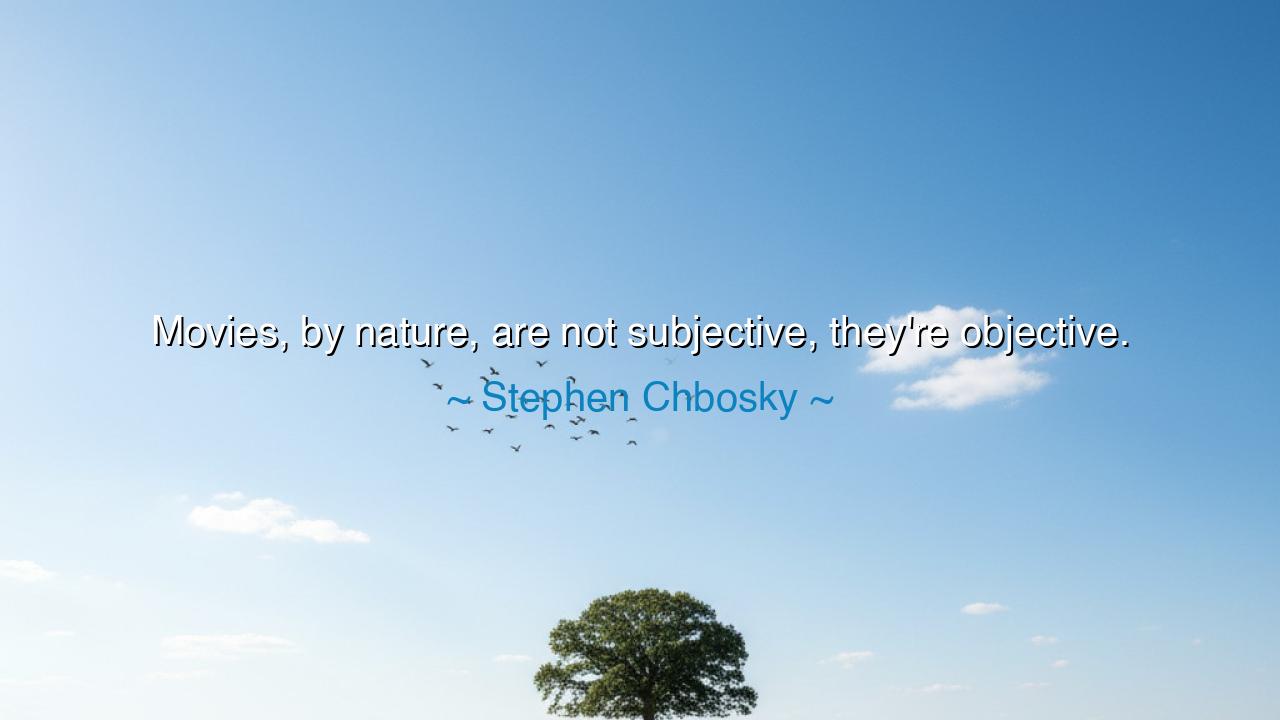
Movies, by nature, are not subjective, they're objective.






In the world of art, there exists a dynamic tension between subjectivity and objectivity—between what we feel and what is presented before us. Stephen Chbosky, in his reflection on the nature of movies, offers us a profound truth when he says, "Movies, by nature, are not subjective, they're objective." These words, simple yet powerful, illuminate the essence of what it means to experience a film. For in the world of cinema, the images we see, the sound we hear, and the story we follow are not mere interpretations of reality—they are representations, fixed and shared, of something that exists outside of our individual selves. The film is a creation that seeks to convey truths that can be witnessed by all, not just felt by one.
In the ancient world, stories were not mere reflections of personal emotions; they were shared experiences, collective journeys that carried the audience into the realm of the gods and heroes. Homer, the ancient poet, did not write the Iliad and the Odyssey simply for personal reflection; he crafted these tales to represent the universal struggles of mankind, the fates of heroes, and the will of the gods. These stories were objective in the sense that they were meant to be experienced by all, to be seen, heard, and understood in the same way by those who gathered around the fires to hear them. In this sense, Chbosky’s words reflect the ancient spirit of storytelling—art that serves as a window into a world that exists beyond the individual, a world where truths are told through shared narratives.
Think of the great sculptors and architects of the ancient world, whose works were not merely for personal expression but were made to be witnessed by all who passed through the grand temples and monuments. The Parthenon, for example, was not a monument to the personal whims of its creators, but a symbol for all of Athens, a declaration of its greatness and its place in the world. Similarly, movies, like the art of ancient Greece, are not personal reflections alone; they are created to be experienced by many, to share a common understanding and a collective vision. Cinema is not confined to one perspective, but rather strives to communicate a universal experience that transcends the boundaries of individual lives and reaches for something greater.
The wisdom of Chbosky’s statement also speaks to the power of cinema to shape reality, to present us with a world that exists outside of our own subjective interpretations. Think of great directors like Akira Kurosawa, whose films, though deeply personal in their themes, were crafted to present stories of honor, fate, and justice that could be universally understood. In films like Seven Samurai, the choices of the characters, their actions, and the visual representation of their struggles are not merely about personal emotions, but about conveying a shared truth about the nature of humanity. Kurosawa’s mastery lay in creating a world that felt as if it could be witnessed, not just experienced individually, but understood universally. In this sense, the film becomes not just a medium of personal reflection, but a shared reality, an objective portrayal of a world we all can witness together.
Chbosky’s words remind us that movies, much like the stories of the ancients, are meant to be objective—they exist not only to reflect the inner turmoil of the artist, but to communicate something beyond the artist’s self. In our lives, too, we must strive to create objective truths, to build legacies that transcend our individual experiences and speak to the collective spirit. Whether through art, work, or relationships, we are all crafting stories that will be witnessed by others, stories that will live on in the minds of those who hear them. It is not enough to create for ourselves alone; we must create for the world, for the community, for the future.
The lesson here is simple, yet profound: seek to create in a way that transcends the self. Whether through film, art, or action, let your work be something that can be witnessed and understood by all, not just felt by one. Just as the ancient poets and artists sought to shape their worlds through universal truths, so too must we seek to contribute to a greater shared vision. Our individual experiences may shape our perspectives, but the art we create should reach beyond us, to connect, to inspire, and to transform those who encounter it.
As you walk through this life, remember that you are part of a larger story—a story that is not just your own, but one that belongs to the world. Strive to make your contributions to that story not just for your own reflection, but for the collective good, for the shared experience of humanity. In your work, in your actions, and in your art, seek to craft something objective, something that speaks to the world not through the lens of your own emotions, but through the universal truths that bind us all. And in doing so, you will not only find meaning for yourself but will become part of a greater legacy that transcends time and place.






AAdministratorAdministrator
Welcome, honored guests. Please leave a comment, we will respond soon